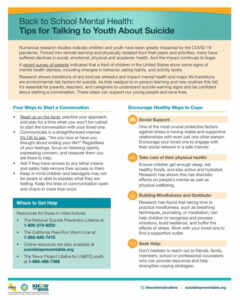
This post was most recently updated on May 2nd, 2024
Recently I asked members of my immediate family to have a mental check-up. Each one asked me, “Why?” Because (most used Mom answer everywhere, every time) because we are living the Chinese proverb: “May you live in exciting times.”
We are living with:
- Social unrest and upheaval on college campuses;
- Civil Unrest (January 6, 2021);
- Social isolation as never before;
- Increase in the number of suicides by young people
And all of this turmoil is inescapable due to social media, newspapers, and TV broadcasts because “if it bleeds, it leads.” So my question to them is, “With all this going on, why aren’t you having a mental check-up”? We have physical checkups each year and dental checkups twice yearly, so why hasn’t everyone added a mental check-up to their list?
September 10 is World Suicide Prevention Day, bringing attention to the fact that 1 in every 100 deaths worldwide is the result of suicide. This cause is important to me because I know people (don’t we all) who have attempted to die by suicide, and I myself have contemplated ending my life. There, I’ve admitted it.
So this World Suicide Prevention Day, I am sharing “Back to School Mental Health: Tips for Talking to Youth About Suicide” by the California Mental Health Services Authority. Please take a few minutes to read the article, download the resource sheet and post the sheet where your family can see it. #bethelight #WorldSuicidePreventionDay
Back to School Mental Health: Tips for Talking to Youth About Suicide
Numerous research studies indicate children and youth have been greatly impacted by the COVID-19 pandemic. Forced into remote learning and physically isolated from their peers and activities, many have suffered declines in social, emotional, physical, and academic health. And the impact continues to linger.
A recent survey of parents indicated that a third of children in the United States show some signs of mental health distress, including changes in behavior, eating habits, and activity levels.
Research shows transitions of any kind are stressful and impact mental health and major life transitions are environmental risk factors for suicide. As kids readjust to in-person learning and new routines this fall, it’s essential for parents, teachers, and caregivers to understand the suicide warning signs and be confident about starting a conversation. These steps can support our young people and save lives.
Four Ways to Start a Conversation
- Read up on the facts, practice your approach, and plan for a time when you won’t be rushed to start the conversation with your loved one.
- Communicate in a straightforward manner. It’s OK to ask, “Are you now or have you thought about ending your life?” Regardless of your feelings, focus on listening openly, expressing concern, and re-assure them that you are there to help.
- Ask if they have access to any lethal means and safely help remove their access to them.
- Keep in mind children and teenagers may not be aware or able to express what they are feeling. Keep the lines of communication open and check-in more than once.
Encourage Healthy Ways to Cope
- Social Support: One of the most crucial protective factors against stress is having stable and supportive relationships with even just one other person. Encourage your loved ones to engage with their social network in a safe way.
- Take care of their physical health: Ensure children get enough sleep, eat healthy foods, and stay active and hydrated. Research has shown this has dramatic effects on people’s mental as well as physical well-being.
- Building Mindfulness and Gratitude: Research has found that taking time to practice mindfulness, such as breathing techniques, journaling, or meditation, can help children to recognize and process emotions, build resilience, and buffer the effects of stress. Work with your loved one to find a supportive outlet.
- Seek Help: Don’t hesitate to reach out to friends, family members, school, or professional counselors who can provide resources and help strengthen coping strategies.
Where to Get Help
Resources for those in crisis include:
- The National Suicide Prevention Lifeline at 1-800-273-8255
- The California Peer-Run Warm Line at 1-855-845-7415
- Online resources are also available at suicideispreventable.org
- The Trevor Project Lifeline for LGBTQ youth at 1-866-488-7386

Leave a Reply
You must be logged in to post a comment.